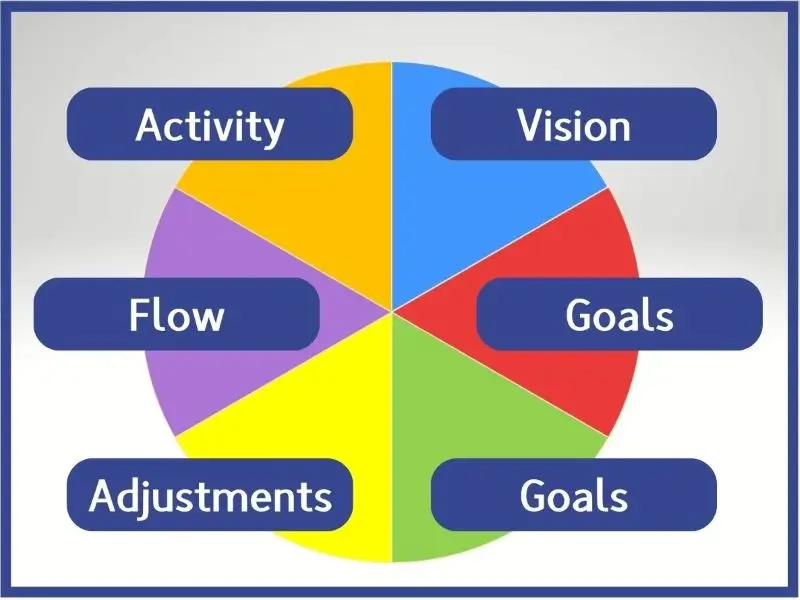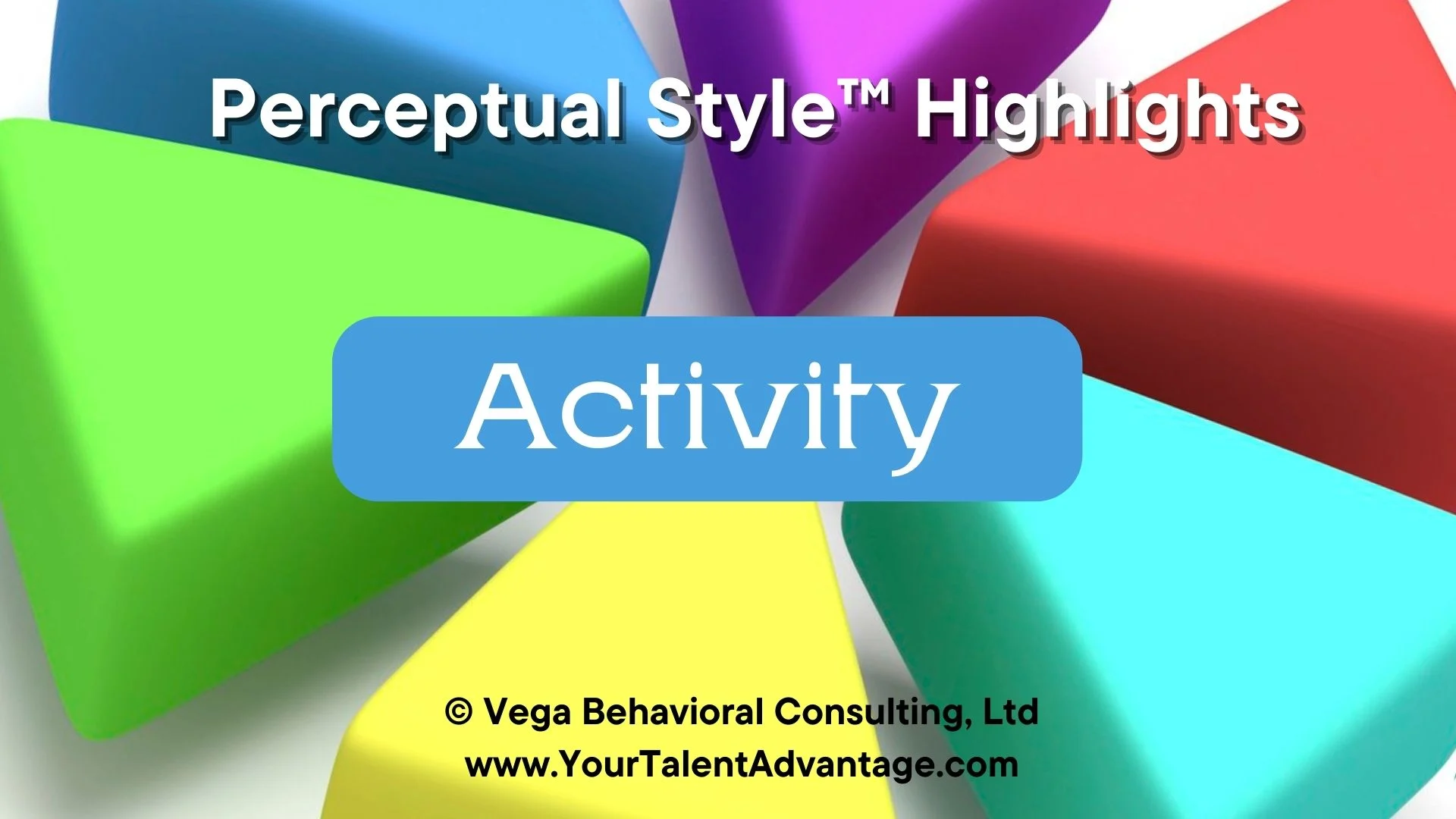
Perceptual Style™ and Conflict
Resolve Differences with Confidence
Conflict shows up in every corner of life — at home, at work, with friends, with strangers. It can spark from a small misunderstanding or grow from long-standing differences. And while it’s easy to label conflict as something “bad” or to be avoided, the truth is, conflict is simply part of being human.
Here’s what really matters: how you perceive conflict and how you respond to it. That’s where Perceptual Stylemakes all the difference. When you understand how you naturally react — and how others might experience the same situation differently — you shift from being caught in conflict to navigating it with clarity, empathy, and confidence.

Why Understanding Conflict Matters
Your approach to conflict echoes far beyond the disagreement itself — it shapes relationships, trust, and emotional connection over time.
Conflict doesn’t have to be destructive. When you respond with awareness and intention, it can become a path to:
-
Clarity and understanding – Defuse tension by recognizing different viewpoints and uncovering what’s really at stake.
-
Stronger relationships – Handling conflict with care shows respect and deepens trust.
-
Creative breakthroughs – Honest disagreement can open the door to innovation and new ways forward.
-
Personal growth – Facing conflict builds resilience, emotional maturity, and self-awareness.
By understanding your Perceptual Styleyou gain insight into your go-to responses — and how to adapt them to connect rather than divide.
The Perceptual Style Advantage
Developed by Dr. Gary Jordan PhD and Lynda-Ross Vega, the Perceptual Style Theory™ identifies six distinct ways people perceive the world. These Perceptual Stylesinfluence how we approach challenges, including conflict.
Each of the six Perceptual Stylesbrings its own strengths, reactions, and strategies for handling collaboration. Understanding your style helps you:
Understand your natural conflict-resolution strengths.
Recognize how others perceive and handle disagreements.
Build stronger relationships that withstand disagreements and promote mutual respect.
Knowing your Perceptual Stylegives you a powerful advantage in understanding, responding to, and resolving conflict with clarity and confidence.

Explore the Six Perceptual Styles and Conflict
Curious about how different Perceptual Styles approach conflict? Explore below for insights into each unique style:
Not Sure Which Style Sounds Like You?
Imagine navigating conflict with clarity instead of confusion. That’s just what you will be able to do, thanks to the Perceptual Style Assessment,as it will reveal how you naturally respond under stress and disagreement:
Respond with confidence, not defensiveness.
Turn tension into meaningful dialogue.
Build trust, even in the tough moments.
Frequently Asked Questions about Perceptual Style and Conflict
What is Perceptual Style™ and how does it relate to conflict?
Perceptual Style™ is the natural lens through which you perceive the world. It influences how you interpret disagreements, respond to conflict, and communicate with others. Understanding your style helps you navigate conflicts with clarity, empathy, and confidence.
Why should I care about understanding conflict?
Conflict affects relationships, trust, and collaboration. Responding with awareness rather than avoidance can lead to stronger connections, creative solutions, and personal growth instead of tension or frustration.
How does knowing my Perceptual Style™ help me handle conflict?
By knowing your style, you can:
Recognize your automatic responses in disagreements,
Understand how others perceive the same situation,
Adapt your approach to reduce tension and improve outcomes.
How many Perceptual Styles are there and what are they?
There are six Perceptual Styles. Each style has unique ways of perceiving the world, strengths in handling challenges, and strategies for resolving conflict. Examples include Activity, Adjustments, Flow, Goals, Methods, and Vision.
Can conflict actually be positive?
Yes. When handled consciously, conflict can:
Reveal hidden issues,
Strengthen relationships,
Foster innovation,
Support personal growth and resilience.
What types of conflicts can Perceptual Style™ help me with?
It applies to all areas of life—at work, home, in friendships, or even casual interactions. The framework helps you navigate misunderstandings, long-term disagreements, and collaborative challenges.
How do the six styles approach conflict differently?
Each style has its own tendencies:
Activity: Notices meaningful conflict early and focuses on relationships.
Adjustments: Gathers information and presents clear solutions.
Flow: Aims to restore harmony and repair relationships.
Goals: Tackles conflict directly to find immediate results.
Methods: Resolves conflict logically and objectively.
Vision: Uses conflict as a growth opportunity and encourages constructive dialogue.
What is the Perceptual Style Assessment™?
The assessment identifies your natural style in conflict and stress. It provides insight into your strengths, typical reactions, and how to interact more effectively with others, helping you respond with confidence rather than defensiveness.
How can understanding others’ styles improve relationships?
When you understand other people’s styles, you can:
Reduce misunderstandings,
Communicate more effectively,
Tailor your approach to build trust,
Promote collaboration even in challenging situations.
What benefits will I gain by applying Perceptual Style™ in conflicts?
You can:
Respond to disagreements calmly and confidently,
Transform tension into meaningful dialogue,
Strengthen trust and relationships,
Solve problems more creatively,
Grow personally and professionally from each conflict experience.
Curious to know more about each of the six Perceptual Styles?
To see a three minute presentation on a specific Perceptual Styleplease click on the specific image below
 Lynda-Ross Vega has been fascinated by what makes people tick since she was a child. Her curiosity about human diversity and how to bring out the best in each person led her to a multifaceted career in the financial, technology, and behavioral consulting sectors. She has played roles that include top executive, entrepreneur, business owner, consultant, coach, daughter, sister, wife, stepmother, and grandmother.
Lynda-Ross Vega has been fascinated by what makes people tick since she was a child. Her curiosity about human diversity and how to bring out the best in each person led her to a multifaceted career in the financial, technology, and behavioral consulting sectors. She has played roles that include top executive, entrepreneur, business owner, consultant, coach, daughter, sister, wife, stepmother, and grandmother. Gary Jordan, Ph.D., has over 40 years of experience in clinical psychology, behavior assessment, individual development, and coaching. He earned his doctorate in clinical psychology from the California School of Professional Psychology—Berkeley in 1980.
Gary Jordan, Ph.D., has over 40 years of experience in clinical psychology, behavior assessment, individual development, and coaching. He earned his doctorate in clinical psychology from the California School of Professional Psychology—Berkeley in 1980.




